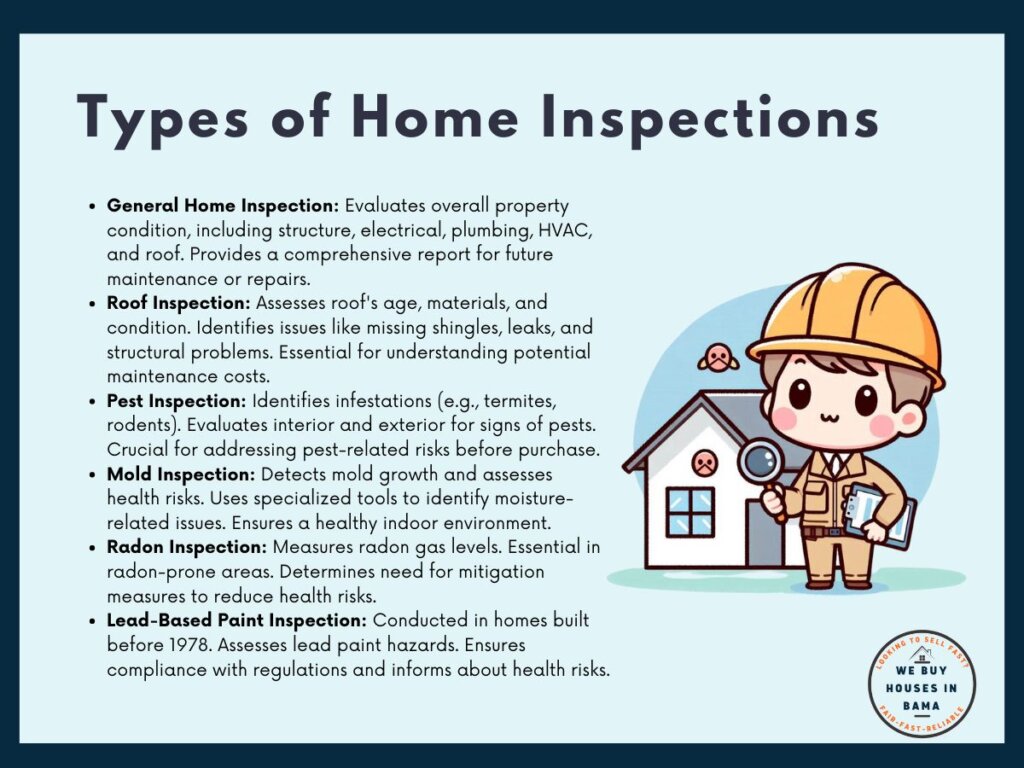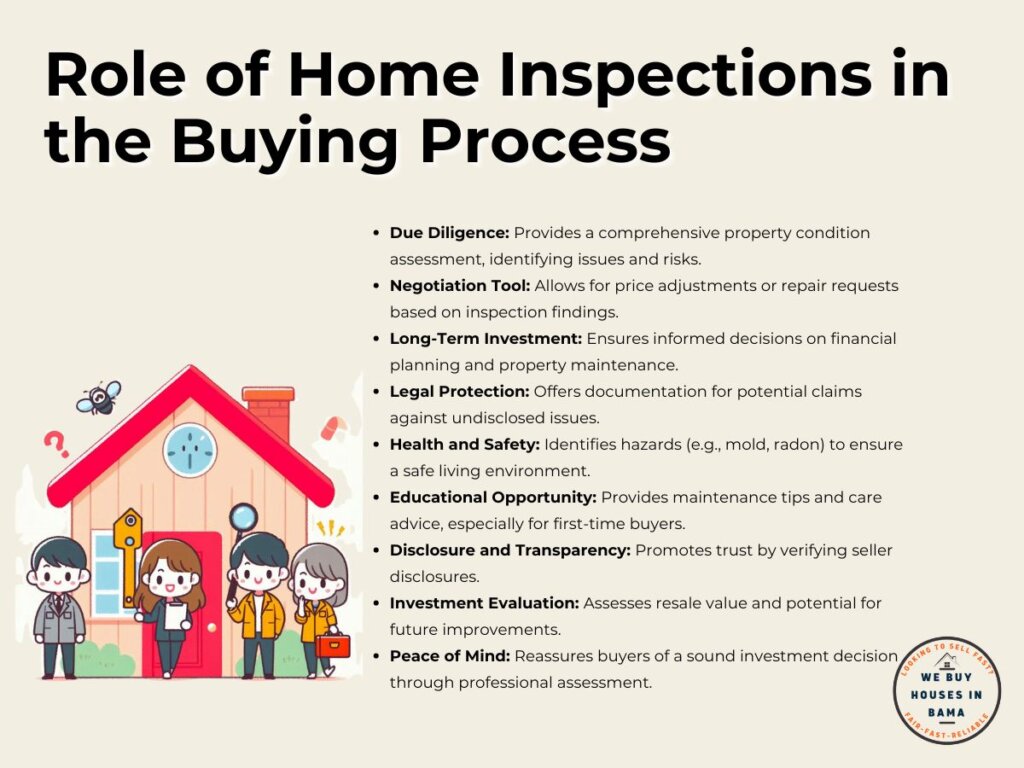Home inspections are a crucial step in the journey of purchasing a property, offering prospective buyers invaluable insights into the condition and integrity of their potential investment. Whether you’re considering a charming older home or a newly constructed property, the thorough examination conducted during a home inspection can uncover hidden issues that might not be apparent during a routine walkthrough.
Beyond just assessing the superficial aesthetics, these inspections delve deep into the structural, mechanical, and safety aspects of a home, providing buyers with a comprehensive understanding of what they are purchasing. The process not only identifies existing problems but also highlights potential areas that may require maintenance or repair in the future.
For buyers, this knowledge serves as a critical tool in decision-making, allowing them to negotiate repairs or pricing based on the inspection report.
Types of Home Inspections
When embarking on the journey of buying a home, understanding the various types of inspections available can significantly enhance your decision-making process. Each type of inspection serves a specific purpose, targeting different aspects of the property to ensure a comprehensive evaluation.
Here’s a breakdown of the most common types:

1. General Home Inspection
A general home inspection is the cornerstone of the inspection process, providing a thorough assessment of the overall condition of the property. Conducted by a certified inspector, this inspection covers essential components such as the structural integrity, electrical systems, plumbing, HVAC (Heating, Ventilation, and Air Conditioning) systems, roof, and other visible features.
The inspector examines the property both inside and out, looking for any existing issues or potential concerns that could affect its value or safety. The findings are documented in a detailed report, which serves as a roadmap for the buyer to understand the property’s current state and plan for future maintenance or repairs.
2. Roof Inspection
A roof inspection focuses specifically on the condition of the property’s roof structure and materials. Roofs are critical to the integrity of a home, protecting it from weather elements and ensuring its longevity.
During this inspection, the inspector evaluates the roof’s age, materials, current condition, and any signs of damage or wear. Common issues identified include missing or damaged shingles, leaks, improper installation, or structural issues.
Depending on the type of roof (e.g., asphalt shingles, metal, tile), specific inspection methods may be employed to thoroughly assess its condition. A detailed roof inspection helps buyers understand potential maintenance costs and whether immediate repairs or replacements are necessary to safeguard their investment.
3. Pest Inspection
Pest inspections are essential, especially in regions prone to infestations or specific types of pests like termites. Conducted by a licensed pest inspector, this examination focuses on identifying any current infestations or conditions conducive to pest activity.
Common pests inspected for include termites, rodents, ants, beetles, and other wood-destroying organisms. The inspector evaluates both the interior and exterior of the property, looking for signs such as droppings, damage to wood structures, mud tubes, or nests.
A pest inspection report provides buyers with crucial information about potential risks and necessary treatments, ensuring they are aware of any pest-related issues before finalizing the purchase.
4. Mold Inspection
Mold inspections are conducted to identify the presence of mold within a property and assess potential health risks associated with it. Mold can develop in areas with moisture or water intrusion, posing health concerns such as allergies, respiratory issues, or structural damage over time.
Certified mold inspectors use specialized tools and techniques to detect mold growth, assess its extent, and provide recommendations for remediation if necessary. This inspection is crucial for ensuring a healthy indoor environment and addressing any moisture-related issues before they worsen.
5. Radon Inspection
Radon inspections focus on measuring the levels of radon gas within a property. Radon is a naturally occurring radioactive gas that can seep into homes through cracks or gaps in the foundation, posing long-term health risks such as lung cancer.
Certified radon inspectors use specialized equipment to measure radon levels and determine if mitigation measures are needed to reduce exposure risks. This inspection is especially important in radon-prone areas or regions where high radon levels have been detected in the past.
6. Lead-Based Paint Inspection
Lead-based paint inspections are conducted in homes built before 1978, when lead-based paint was commonly used. Lead poses serious health risks, particularly to young children and pregnant women.
Inspectors assess painted surfaces for lead content and provide recommendations for managing or removing lead-based paint hazards safely. This inspection ensures compliance with regulations and helps buyers make informed decisions about potential health risks associated with older homes.
Timing of Home Inspections
Home inspections play a crucial role at different stages of the home buying process, offering buyers essential information and protection. Here’s how timing impacts the effectiveness and purpose of home inspections:
1. Before Sale
Before committing to purchasing a property, buyers typically conduct inspections to thoroughly assess its condition. The primary purpose of pre-purchase inspections is to uncover any existing issues or potential concerns that may affect the property’s value or livability.
This early assessment also provides negotiation leverage, allowing buyers to request repairs or adjustments to the purchase price based on the inspection report. It also helps buyers plan for future maintenance costs, ensuring they are well-informed before making a substantial financial commitment.
2. After Sale (Post-Purchase Inspection)
Post-purchase inspections, also known as final walkthroughs, occur after the seller has accepted the buyer’s offer and any agreed-upon repairs or renovations are completed. The primary purpose of this inspection is to verify that all contractual obligations regarding repairs or renovations have been fulfilled according to the terms of the purchase agreement.
Buyers use this opportunity to ensure that the property is in the agreed-upon condition before finalizing the transaction. The post-purchase inspection serves as a final check to confirm that the property meets the buyer’s expectations and complies with all contractual agreements, providing peace of mind and ensuring a smooth transition into homeownership.
Can the Buyer Choose Their Own Inspector?
In the home buying process, buyers have the option to select their own inspector rather than relying solely on recommendations or inspections arranged by the seller or real estate agent. Here are key reasons why choosing an independent inspector is advantageous:
1. Independence
Selecting your own inspector ensures an unbiased assessment of the property’s condition. An independent inspector works solely in the buyer’s interest, without any influence from the seller or real estate agents.
This impartiality is crucial in providing an honest evaluation of the property’s strengths, weaknesses, and potential issues, giving buyers confidence in the inspection process.
2. Expertise
Buyers may choose an inspector based on their specific expertise or experience relevant to the property in question. For instance, inspectors familiar with historic homes or specialized systems such as solar panels or geothermal heating can offer tailored insights into unique features or potential maintenance requirements.
This specialized knowledge enhances the thoroughness of the inspection and ensures that all aspects of the property are carefully evaluated.
3. Comfort
Having the freedom to select their own inspector provides buyers with peace of mind regarding the thoroughness and quality of the inspection. Buyers can choose an inspector based on personal recommendations, reviews, or qualifications, ensuring they feel comfortable and confident in the inspector’s abilities to uncover any potential issues that may impact their decision to purchase the property.
Role of Home Inspections in the Buying Process
Home inspections serve multiple critical roles in the home buying process, providing essential information and protections for buyers. Here’s a detailed exploration of their roles:

1. Due Diligence
Home inspections are a vital aspect of due diligence for buyers. They offer a comprehensive assessment of the property’s condition, identifying existing issues and potential risks that may not be apparent during a casual viewing.
This thorough evaluation helps buyers avoid unforeseen costs or repairs after purchasing the property.
2. Negotiation Tool
Inspection findings serve as a powerful negotiation tool during the home buying process. The detailed report provided by the inspector outlines any deficiencies or necessary repairs identified in the property.
Armed with this information, buyers can negotiate with sellers to address repairs before closing the deal or adjust the purchase price to account for the cost of necessary repairs and maintenance. Conversely, sellers may choose to rectify issues to maintain the deal or adjust the sale price accordingly.
3. Long-Term Investment
Investing in a home is a significant financial commitment, and home inspections play a crucial role in protecting this investment. By understanding the property’s condition and potential maintenance needs, buyers can make informed decisions about their long-term financial planning.
Assessing the structural integrity, mechanical systems, and overall maintenance requirements ensures that buyers are prepared for ongoing costs and responsibilities associated with homeownership. This proactive approach helps mitigate future surprises and enhances the overall sustainability of the investment.
4. Legal Protection
Home inspections provide legal protection for buyers against undisclosed issues that may arise post-purchase. If significant problems are discovered after closing that were not disclosed or properly addressed during the inspection process, buyers may have legal recourse against the seller or other parties involved.
The inspection report serves as documentation of the property’s condition at the time of inspection, supporting potential claims and ensuring buyers’ rights are protected. This legal safeguard reinforces the importance of conducting thorough inspections as part of the home buying process, offering peace of mind and security for buyers.
5. Health and Safety
Home inspections help ensure the health and safety of occupants. Inspectors evaluate potential hazards such as mold, radon, asbestos, or faulty electrical wiring that could pose risks to the well-being of residents.
Identifying these issues allows buyers to address them promptly, creating a safer living environment and reducing health-related concerns.
6. Educational Opportunity
For many buyers, especially first-time homeowners, home inspections serve as an educational opportunity. Inspectors often provide insights into the maintenance and care required for the property. They may offer tips on energy efficiency improvements, proper upkeep of systems like HVAC, and strategies to prevent future issues.
This knowledge empowers buyers to be proactive in maintaining their investment and enhancing the longevity of the property.
7. Disclosure and Transparency
Home inspections promote transparency and disclosure between buyers and sellers. Sellers are encouraged to disclose known issues upfront, and buyers have the opportunity to verify these disclosures through inspections.
This transparency builds trust in the transaction process and reduces the likelihood of disputes arising after the sale.
8. Investment Evaluation
Beyond immediate repairs and maintenance, home inspections assist buyers in evaluating the overall investment potential of the property. Inspectors may assess the property’s resale value, marketability, and potential for future improvements or renovations.
This evaluation aids buyers in making informed decisions aligned with their financial goals and long-term investment strategies.
9. Peace of Mind
Ultimately, home inspections provide buyers with peace of mind. Knowing that a thorough assessment has been conducted by a qualified professional reassures buyers that they are making a sound investment decision.
Whether confirming the property meets their expectations or identifying issues that need addressing, inspections contribute to a confident and satisfying home buying experience.
The 9 Benefits of Selling Your House As-Is
Home inspections are indispensable tools that play a pivotal role in the home buying process, offering invaluable benefits to both buyers and sellers alike. They provide buyers with a thorough understanding of a property’s condition, allowing for informed decisions and proactive planning for maintenance and repairs.
When sellers opt to sell their property as-is, they typically do so to avoid the hassle and expense of making repairs or improvements. For buyers, this approach underscores the importance of conducting thorough inspections before finalizing the purchase.
By choosing to buy a house as-is, buyers assume responsibility for any existing issues or repairs needed after the sale. It empowers them to make informed decisions about whether to proceed with the purchase, negotiate terms based on the inspection findings, or plan for necessary repairs post-closing.
